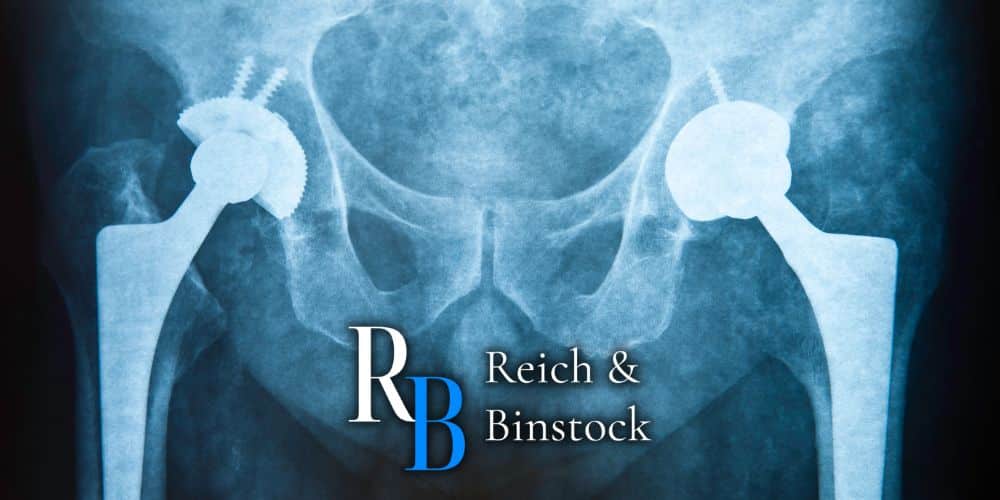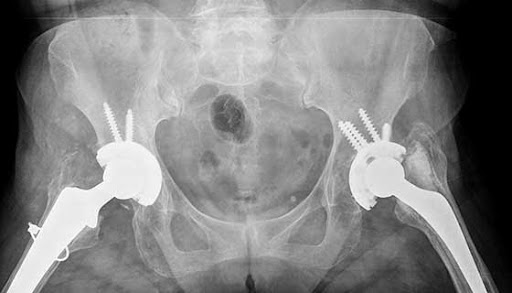HIP REPLACEMENT LAWSUIT IN HOUSTON, TX
Hip Replacement Lawsuit

Over the last 20 years, hip device manufacturers (such as Stryker Orthopaedics) have paid over $7.5 billion as a settlement agreement for their recalled devices and resulting health complications from these devices. Lawsuits claim that defective devices (such as Stryker hip implants) have caused metal poisoning, surrounding tissue damage, nerve damage, and more. As a result, thousands of patients with artificial hips have required a revision surgery.
Unfortunately, more than 14,000 cases of defective hip devices are still in process as of July 2019. If a Stryker hip implant or any other recalled hip device has caused you major side effects, you can certainly secure financial compensation through a hip replacement lawsuit. You can also contact our firm about an Exactech recall lawsuit regarding a hip, ankle, or knee replacement implant. Call a Reich & Binstock personal injury attorney today at 713-622-7271 for a free case evaluation.
Attorney Robert J. Binstock has more than 30 years of experience handling complex personal injury litigation. He served as chair for the American Association of Justice’s Zimmer Hip Implant Litigation Group.
Non-Surgical Hip Pain Treatments
Because there have been thousands of defective hip implants that have fuelled a surge of hip replacement lawsuits in the U.S., it’s important to consider all your options. It’s possible that the following non-surgical treatments can provide pain relief so that you can avoid the stress of a potential revision surgery due to serious complications.
- Gentle exercises that can improve mobility and strengthen muscles around the hips
- Walking aids such as canes and walkers to assist daily mobility
- Over the counter non-steroidal anti-inflammatory (NSAID) painkillers
Signs That You May Need a Hip Replacement
The main reason why someone may need a hip replacement device is due to hip joint damage or inflammation. People who suffer from osteoarthritis, rheumatoid arthritis, osteonecrosis, and bone tumors often require an artificial hip joint. Anyone who has suffered injuries to their hips may need a hip implant as well. Listed below are common signs of hip damage and signs that you certainly need a hip implant.
- Constant hip pain that interferes with your daily life like pain while walking, standing, sitting, etc.
- Hip stiffness that makes it difficult for you to lift your leg
- General groin pain
- Non-surgical treatments haven’t provided relief
- Your hip pain and resulting mobility issues have caused significant mental health issues
- Your doctor has ruled out all other health problems that could cause severe pain and stiffness in the hips
Common Types of Hip Implants
If you qualify for a hip implant, you could choose between several different types depending on what your doctor believes is best for you. Listed below are the most common types of hip replacement devices.
- Metal-on-polyethylene (MOP): This partially metal hip implant is one of the most common types that doctors have recommended since the 60s. The socket is made out of polyethylene (or plastic) while the ball is made out of metal. Although the polyethylene provides less friction, it can gradually produce plastic debris that can lead to a defective hip implant down the road.
- Metal-on-metal (MOM): Doctors in the United States no longer offer this kind of metal hip implant because it gradually creates too many metal particles in the body. The dangerous debris can lead to metallosis, which is basically metal poisoning. Although MOM hip implants are no longer available, many Americans still have these devices in their bodies.
- Ceramic-on-polyethylene (COP): This type of hip implant has a ceramic ball and a plastic socket. Similarly to the MOP hip implant, the COP one may also create excess plastic debris in the body which may eventually lead to a defective medical device.
- Ceramic-on-Ceramic (COC): This device has a ceramic ball and socket which has an approximate 91% survivorship over the course of 20 years, according to a study conducted by Dr. Laurent Sedel.
- Ceramic-on-metal (COM): This device has a ceramic ball with a metal socket and is one of the newest, partially metal hip implants on the market. The FDA approved the first COM device in 2011.
Recalled Hip Replacement Devices
When first introduced, metal hip implants promised increased mobility for patients suffering from hip joint deterioration.
Unfortunately, numerous patients have experienced problems with metal hip implants, leading to recalls and warnings from the U.S. Food and Drug Administration (FDA). Some of the recalled implants were manufactured by:
- DePuy Orthopaedics
- Zimmer Holdings
- Stryker Orthopaedics
- Smith & Nephew
- Biomet
- Wright Medical
Listed below are the most popular implants created by the aforementioned manufacturers that were later recalled.
- Stryker Rejuvenate Hip Implant and the ABG II hip implant
- DePuy ASR Acetabular & Resurfacing System
- Zimmer Durom Acetabular Component
- Wright Medical Conserve Plus and Profemur Z Hip Stem
- Smith & Nephew R3 Acetabular, Modular SMF, and Modular Redapt Femoral Hip Systems
Out of all the previously mentioned manufacturers, the Stryker corporation has had the most recalls since 2002.
Common Reasons for a Hip Replacement Lawsuit
All artificial hip implants carry a degree of risk, including the risk that the material used to make the implant will wear out and need a replacement. The metal hip implant was thought to be the most durable, but instead have presented their own complications involving:
- Metal sensitivity: Some patients become sensitive to the metals, including particulate degree, which are used to make the hip implants. Elevated metal levels caused by MOM implants can lead to immune reactions and tissue necrosis surrounding the defective implant.
- Metal poisoning: Some implants contain cobalt and chromium alloys in their metal parts, which can build up to toxic levels.
- Nerve palsy: While rare, some patients suffer injury of the sciatic and femoral nerves.
- Pain: Some patients develop chronic hip pain after receiving defective implants.
- Premature wear: The metal components in some MOM implants wear down prematurely, subjecting the patient to the pain and medical bills of a revision surgery in order to replace the implant.
How Do I Know if My Hip Replacement Will Fail?
All hip replacements are different. It’s up to your doctor to give you a thorough analysis of your Stryker hip replacement and explain how your body has reacted to it. You may feel more comfortable after asking your doctor to check your bloodstream for excess metals. Be vigilant about your health, make note of your symptoms, and contact your doctor if you are experiencing symptoms of hip replacement failure.
Common Signs of a Hip Implant Failure
As with any medical device, a hip implant comes with its own set of risks and complications. If you happen to experience any of the complications listed below, contact your doctor immediately because you may need a hip revision surgery.
- Blood clots or excess bleeding
- Limping and a loss of mobility
- Blood vessel injuries
- Hip dislocation
- Hip fractures
- Infection in or around the hip joint
- Swelling around the hip joint
- Differences in leg length
- Loose hip implant caused by osteolysis, which is condition where inflammation destroys the bone
- Nerve injuries
- Constant pain following hip replacement device surgery
- Constant stiffness
- Metallosis, also known as metal poisoning or metal toxicity
Benefits of Filing a Hip Replacement Lawsuit
If you’re suffering from a Stryker hip implant, you could recover appropriate compensation through a lawsuit. You may receive damages for:
- Pain and suffering
- Medical bills from a Stryker hip implant revision surgery
- Lost wages due to a Stryker hip replacement
- Future rehabilitation bills
- Loss of earning capacity relating to the pain caused by Stryker hip implants
What is the Statute of Limitations for Hip Replacements in Texas?
Your injury claim is subject to a two year long statute of limitations in Texas. This means that you must file a lawsuit no later than two years after you started suffering from hip replacement complications. It can take time to prepare a thorough and effective claim, so don’t wait until the last minute to contact a defective medical device attorney at Reich & Binstock.

Contact a Houston Defective Medical Device Attorney Today
If you have hip pain or other health problems after receiving a Stryker hip replacement, call a Reich & Binstock personal injury attorney at 713-622-7271 to schedule a free, no-obligation consultation. It doesn’t matter what state you live in — we represent clients nationwide who have been injured by defective medical devices. You may be entitled to compensation for medical expenses, pain and suffering, and other losses.There is never a fee unless we recover on your behalf.














